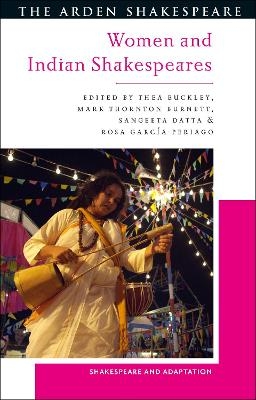
Women and Indian Shakespeares
The Arden Shakespeare (Verlag)
978-1-350-23436-9 (ISBN)
In repeated iterations, the collection turns our attention to localized modes of adaptation that enable opportunities for women while celebrating Shakespeare’s gendered interactions in India’s rapidly changing, and increasingly globalized, cultural, economic and political environment. In the contributions, we see a transformed Shakespeare, a playwright who appears differently when seen through the gendered eyes of a new Indian, diasporic and global generation of critics, historians, archivists, practitioners and directors. Radically imagining Indian Shakespeares with women at the centre, Women and Indian Shakespeares interweaves history, regional geography/regionality, language and the present day to establish a record of women as creators and adapters of Shakespeare in Indian contexts.
Thea Buckley is a Research Assistant at Queen’s University Belfast, UK. Mark Thornton Burnett is Professor of Renaissance Studies at Queen's University Belfast, UK. Sangeeta Datta is a writer, director, independent filmmaker and cultural commentator, India/UK. She is Director of Baithak, a non-profits arts company, and Stormglass Productions. Rosa García-Periago is a Senior Lecturer at the University of Murcia, Spain.
List of Figures
Notes on Contributors
Acknowledgements
A Note on References
Introduction: Thea Buckley, Mark Thornton Burnett, Sangeeta Datta and Rosa García-Periago
Chapter One: Poonam Trivedi (University of Delhi), ‘The “woman’s part”: Recovering the Contribution of Women to the Circulation of
Shakespeare in India’
Chapter Two: Paromita Chakravarti (Jadavpur University), ‘Framing Femininities: Desdemona and Indian Modernities’
Chapter Three: Priyanka Basu (King's College, London, UK) and Arani Ilankuberan (British Library), ‘Indian Shakespeares in the British Library Collections:
Translation, Indigeneity and Representation’
Chapter Four: Thea Buckley (Queen’s University Belfast), ‘Women Translating Shakespeare in South India: Hemanta Katha, or The Winter’s Tale’
Chapter Five: Mark Thornton Burnett (Queen’s University Belfast) and Jyotsna Singh (Michigan State University), ‘“I dare do all that may become a
man”: Martial Desires and Women as Warriors in Veeram, a Film Adaptation of Macbeth’
Chapter Six: Taarini Mookherjee (Columbia University), ‘“You should be women”: Bengali Femininity and the Supernatural in
Adaptations of Macbeth’
Chapter Seven: Nishi Pulugurtha (Brahmananda Keshab Chandra College), ‘Romeo and Juliet Meets Rural India: Sairat and the Representation
of Women’
Chapter Eight: Jennifer T. Birkett (Notre Dame University), ‘Dy(e)ing Hands: The Hennaed Female Agent in Vishal Bhardwaj’s Tragedies’
Chapter Nine: Rosa García-Periago (University of Murcia), ‘Embattled Bodies: Women, Land and Contemporary Politics in Arshinagar, a Film
Adaptation of Romeo and Juliet’
Chapter Ten: Mark Thornton Burnett (Queen’s University Belfast), ‘Where the Wild Things are: Shifting Identities in Noblemen, a Film Adaptation of The Merchant of Venice’
Chapter Eleven: N. P. Ashley (St Stephen’s College, Delhi), ‘Women Punctuating Shakespeare: Campus Theatrical Experiment, the Shakespeare
Society and the Insider/Outsider Dialectic’
Chapter Twelve: Bornila Chatterjee (filmmaker), Sangeeta Datta (filmmaker), Annette Leday (Annette Leday/Keli Company), Sreedevi Nair (NSS
College for Women), Preti Taneja (University of Newcastle), ‘Adapting Shakespeare: Directors and Practitioners in Conversation’
Appendix: Priyanka Basu (King's College, London) and Arani Ilankuberan (British Library), ‘A Selection of Shakespeare Translations/Adaptations from
the British Library North Indian Languages Collection’
Index
| Erscheinungsdatum | 09.01.2024 |
|---|---|
| Reihe/Serie | Shakespeare and Adaptation |
| Mitarbeit |
Herausgeber (Serie): Professor Mark Thornton Burnett |
| Zusatzinfo | 12 bw illus |
| Verlagsort | London |
| Sprache | englisch |
| Maße | 138 x 216 mm |
| Themenwelt | Kunst / Musik / Theater ► Film / TV |
| Kunst / Musik / Theater ► Theater / Ballett | |
| Geisteswissenschaften ► Sprach- / Literaturwissenschaft ► Anglistik / Amerikanistik | |
| Geisteswissenschaften ► Sprach- / Literaturwissenschaft ► Literaturgeschichte | |
| Geisteswissenschaften ► Sprach- / Literaturwissenschaft ► Literaturwissenschaft | |
| Sozialwissenschaften ► Kommunikation / Medien ► Medienwissenschaft | |
| Sozialwissenschaften ► Soziologie ► Gender Studies | |
| ISBN-10 | 1-350-23436-2 / 1350234362 |
| ISBN-13 | 978-1-350-23436-9 / 9781350234369 |
| Zustand | Neuware |
| Informationen gemäß Produktsicherheitsverordnung (GPSR) | |
| Haben Sie eine Frage zum Produkt? |
aus dem Bereich


